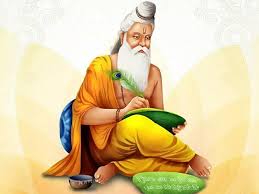Personal Information
- Era: Treta Yuga (exact historical period is unknown; believed to be thousands of years
Summary
Biography
Early Life:
Maharshi Valmiki was born as Ratnakara, into a family of hunters. In his early life, he is believed to have been a highway robber, living by looting travelers to support his family. However, his transformation began after an encounter with the sage Narada.
When Ratnakara asked his family if they would share in the sins of his actions, they refused. Deeply shaken, he renounced his life of crime and began intense penance and meditation, reportedly chanting the name "Rama" continuously. It is said he was so still during his meditation that ants built a mound (valmika) over him — hence the name Valmiki.
Spiritual Transformation:
After years of penance, Ratnakara was transformed into the enlightened sage Valmiki. He became a revered rishi and disciple of Sage Narada.
Composition of the Ramayana:
Valmiki is celebrated as the author of the original Sanskrit Ramayana, one of the greatest epics in world literature, consisting of about 24,000 verses. It narrates the life of Lord Rama, his exile, the abduction of his wife Sita, and the eventual defeat of Ravana.
The Ramayana also holds deep spiritual, moral, and philosophical lessons, and Valmiki is honored as the Ādi Kavi (first poet) for his use of shloka (verse) in composing the epic.
Role in the Ramayana:
Valmiki appears as a character in the Ramayana as well. After Sita is exiled by Rama, she takes refuge in Valmiki’s hermitage and gives birth to Lava and Kusha, the twin sons of Rama. Valmiki raises and educates them, and they eventually recite the Ramayana in Rama’s court, leading to a reunion.
Legacy:
- Valmiki is considered a pioneer of Sanskrit poetry.
- His Ramayana has inspired countless versions and adaptations in various Indian languages.
Valmiki Jayanti, the day believed to mark his birth, is celebrated across India.
Key Teachings and Themes:
- The power of repentance and transformation.
- The importance of dharma (righteousness).
- The value of truth, loyalty, and devotion.
